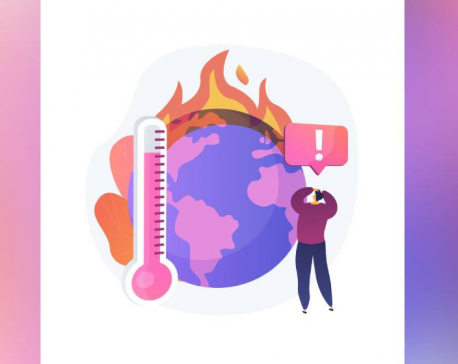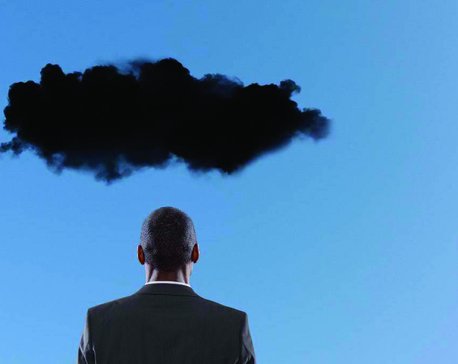
OR
Climate change threatens our survival
Published On: February 6, 2019 02:00 AM NPT By: Republica | @RepublicaNepal
Hindu Kush Himalaya Assessment report released by International Centre for Integrated Mountain Development (ICIMOD) raises alarm for the countries lying in the HKH region. According to the report, one-third of glaciers in the region will melt by the end of the century even if the target of limiting global warming to 1.5 degrees Celsius is achieved. It predicts that temperature of the region will increase to 2.1 degrees by 2100, thereby leading to melting of one-third of the glaciers in the region. Alarmingly, if the target to cap the rising temperatures at 1.5 degrees as set in the Paris Agreement fails, the temperature will rise to five degrees, which will then result in melting of two-thirds of the glaciers in the region. Indeed, the region faces an unprecedented climate crisis. This will put countries like Afghanistan, Bangladesh, Bhutan, China, India, Myanmar, Nepal, and Pakistan in precarious situation—with serious impacts on river system and water resources of the HKH region—source of world’s most important river systems, including the Ganges, Indus, Yellow, Mekong and Irrawaddy.
This is the result of adverse effects of climate change. The report says that since the 1970s, when global warming first set in, glaciers in the HKH have steadily thinned and retreated and snow-covered areas and the amount of snow have decreased. As things stand, we cannot see the snowcapped mountains around the Kathmandu Valley like we used to in the past. And our river systems and sources of water have witnessed multiple crises. One of the causes of this is obviously pollution. Air pollutants originating from the Indo-Gangetic Plains have contributed to threatening level of greenhouse gases rise. As these pollutants deposit black carbon and dust on the glaciers, they hasten their melting and changing monsoon circulation and rainfall distribution over Asia. Consequences can be imagined if the prediction of the report is to come true. And the people to suffer will be among one-third of the 250 million HKH mountain people who live on less than $1.90 a day and are battling against poverty.
It’s urgent for Nepal to take initiatives to save our glaciers which are thinning out quickly. Nepal should be able to raise this issue in the international forums and generate support for mitigating effects. It’s vital also because melting of glaciers will have direct bearing over our water resources, including generation of hydro power potentials which chiefly relies on glaciers. Once the glacier-fed river systems go dry, it will plunge us into the chaos of darkness. But Nepal will not be the only country to suffer. Afghanistan, Bangladesh, Bhutan, China, India, Myanmar, Nepal, and Pakistan will bear the brunt as much. We believe these countries together should devise effective programs and come with measures to tackle the problems they will be facing. HKH nations face the gravest threat to their resources and wellbeing of people. They should together lead the initiative to draw the attention of developed countries—which account for greater share of carbon emission—to the threats being raised. The world has no time to lose to fight human-induced evil of climate change. Vulnerable as they are, HKH countries have no time to sit back and wait for the consequences.
You May Like This

Land, Livelihood and Climate Change
The impact of climate change on land, agriculture, and vulnerable populations is critical to ensuring sustainable livelihoods and food security.... Read More...

Danger of climate doomsayers
Doom and gloom distort our worldview and can lead to bad policies. The future is bright, and we need smart... Read More...

A sustainable lifestyle - take up the challenge
Sustainable living is not just a development sector jargon. Nor is it just a lifestyle trend that gives us bragging... Read More...





Just In
- NRB introduces cautiously flexible measures to address ongoing slowdown in various economic sectors
- Forced Covid-19 cremations: is it too late for redemption?
- NRB to provide collateral-free loans to foreign employment seekers
- NEB to publish Grade 12 results next week
- Body handover begins; Relatives remain dissatisfied with insurance, compensation amount
- NC defers its plan to join Koshi govt
- NRB to review microfinance loan interest rate
- 134 dead in floods and landslides since onset of monsoon this year












Leave A Comment